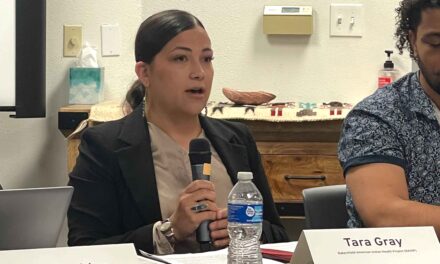California’s “War on Energy Producers”: Sector Leaders, Mineral Owners and Policymakers Blast State Policies
A growing number of mineral owners in California, investors with oil interests in the state, and their advocates in the Legislature are warning that state government in Sacramento is creating an economic climate that is inconducive for their businesses.

By McKenzie Jackson | California Black Media
A growing number of mineral owners in California, investors with oil interests in the state, and their advocates in the Legislature are warning that state government in Sacramento is creating an economic climate that is inconducive for their businesses.
Government overregulation is ripping into earnings and making it hard to do business in the state, they say. And many of the high costs being imposed on them by the state’s Democratic leadership are being passed on to consumers in the form of higher prices at the gas pump.
Republican Assembly Minority Leader James Gallagher (R-East Nicolaus) cited the possible closure of two major refineries in California owned by Chevron, Valero, and Philips 66.
“The real-world consequences of Gavin Newsom’s war on California energy producers are becoming clearer by the day, with today’s announcement that Valero intends to shut down its Benicia refinery within a year. The closure will reduce California’s gasoline production capacity by nearly 9% and cost more than 400 jobs,” read a press release issued by California State Assembly Republicans on April 16.
Similarly, Chevron announced last year that it has plans to relocate its headquarters from San Ramon to Texas. Phillips 66 also announced that it will close its Los Angeles area refinery by the end of 2025.
In another statement Gallagher released on April 23, he predicted the crisis will “only get worse” if California’s energy policies stay the same.
“Our millionaire governor might not worry about gas prices while he’s chauffeured from his mansion in Marin to his podcast studio, but working people are getting crushed by the cost of his out-of-touch agenda,” Gallagher said, citing two laws passed by Democrats that he says are contributing to the higher cost of gas: SB X1-2 and AB X2-1, anti-price-gouging laws that took effect in 2023.
“Once again, Californians are paying the price for Newsom’s incompetence and self-serving attacks on energy producers. As fuel producers shut down and flee the state, California drivers are left to foot the bill – with gas prices an astounding $1.70 higher than the national average,” he added.
Last week, Newsom wrote a letter to California Energy Commission Vice Chair Siva Gunda instructing him to intervene to ensure that oil producers not leave the state.
In the letter, the Governor asked Gunda “to reinforce the State’s openness to a collaborative relationship and our firm belief that Californians can be protected from price spikes and refiners can profitably operate in California — a market where demand for gasoline will still exist for years to come.”
Smaller mineral owners in the state are also fed up with California’s environmental policies that they say have no scientific justification.
A pair of Southern California mineral owners hit the California state government with a lawsuit on April 16 challenging the constitutionality of a law that bans new drilling and well maintenance within 3,200 feet of sensitive sites such as hospitals, homes, parks, and schools.
Siblings Monte Beard Sr. and Merry Vanderwaal, the property rights owners of subsurface oil and gas hydrocarbon reserves in Long Beach,
allege in their 22-page lawsuit that Senate Bill 1137, which took effect in June 2024, threatens the livelihoods of royalty and mineral rights owners throughout the Golden State, lowers property values, and pushes the state toward more reliance on oil from foreign countries, where there are sometimes substandard environmental and labor protections and well-known human rights abuses.
Beard said in a statement that his family has owned mineral rights since 1929, and the royalties he receives helped him pay for his kids’ college education.
“I’d like them to be around as a legacy for my grandchildren,” Beard said of the royalties. “State officials can’t simply take those royalties away from people at their political whim.”
The lawsuit was filed in Los Angeles Superior Court by attorney John Fogarty of the Los Angeles firm Maynard Nexsen LLP. The respondents and defendants in the claim are the State of California, California Department of Conservation, and Geologic Energy Management Division.
When California Black Media contacted the California Department of Conservation, the agency’s Assistant Director of Communications Jacob Roper said the state does not comment on pending litigation.
According to court records, there is a trial setting conference scheduled for July 24.
SB 1137, signed into law in 2022, also stops maintenance and redrilling at mineral sites, keeping old wells closed. The legislation was championed by environmental advocates, who said the law is needed to phase out planet-warming fossil fuels and protect residents who live near the toxic fumes dispersed by drill sites.
California has over 100,000 unplugged oil and gas wells and close to one-third are within 3,200 feet of sensitive areas. That proximity exposes millions to cancer-causing pollutants, according to opponents of the legislation. The U.S.’s largest urban oilfield, the Inglewood oilfield, is located close to Baldwin Hills, Culver City, Inglewood, and Ladera Heights – L.A. County neighborhoods with significant Black populations.
“Among other things, SB 1137 includes a wholly arbitrary 3,200-foot setback, which effectively eliminates the possibility that any oil well can be utilized to its full potential because it is within 3,200 feet of a ‘sensitive receptor.’ There is no credible scientific report or analysis to support this arbitrary 3,200-foot setback,” the claim reads.
Beard and Vanderwaal’s property inside the Long Beach Unit (LBU) of Wilmington Field, an oil field, includes 867 active or idle wells. The city of Long Beach took the surface via eminent domain in the 1950s, but the family maintained the mineral rights, which allow them to generate the royalty income.
Beard and Vanderwaal each receive $3,600 annually in royalties from the oil field on the property, which is leased to THUMS Long Beach to extract the hydrocarbons.
Another royalty owner, Kevin Ivey, said in a statement that the lawsuit is a moral imperative.
“Royalty and mineral rights owners refuse to stand by as Sacramento legislators rob us of our property rights, destroy our livelihoods, and hand over our energy future to hostile foreign adversaries,” he said. “We think California consumers agree.”









